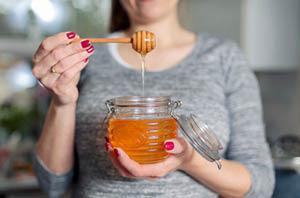Expert Tips for Treating and Preventing Allergies
Seasonal allergies are a common issue for many people, and they occur when the body’s immune system reacts to certain allergens that are present in the environment, such as pollen, grass, or dust.
Symptoms of seasonal allergies include sneezing, runny nose, itchy eyes, and congestion. These symptoms can be uncomfortable and make it difficult to carry out day-to-day activities.
However, there are various ways to manage seasonal allergies, including the use of local honey.
Here are some things you need to know about seasonal allergies and how local honey could potentially help:
What are seasonal allergies?
Seasonal allergies, also known as hay fever or allergic rhinitis, occur when the immune system reacts to airborne allergens such as pollen, grass, or dust. These allergens trigger an immune response, causing symptoms such as sneezing, runny nose, itchy eyes, and congestion.

Honey as a Natural Antihistamine: How It Can Alleviate Allergy Symptoms
How can local honey help?
Local honey can help with seasonal allergies because it contains small amounts of the pollen that causes allergic reactions. Consuming small amounts of local honey can help to desensitize the body to pollen, which can reduce the severity of allergy symptoms over time.
By regularly consuming local honey, the body becomes accustomed to the pollen in the area and becomes less reactive to it.
“There is anecdotal evidence that eating 1-2 teaspoons of coarse-filtered, local honey can benefit those with allergies,” says Arati Gudage, MD of Stellis Health. “You will want to start taking the honey daily before pollen season starts, in order to build up immunity to the pollen found in the honey.”
How much honey should you consume?
Consuming one to two teaspoons of local honey per day can be beneficial in reducing allergy symptoms. It is important to note that honey should not be given to children under the age of one, as it can increase the risk of botulism.
Why is local honey important?
Local honey is important because it is made by bees that live in the same area as you. These bees collect pollen from the same plants and trees that cause seasonal allergies in your area. Consuming local honey can be more effective in reducing allergy symptoms compared to non-local honey, as it contains the specific pollen that is causing the allergic reaction.
Since small doses of local pollen is found in the honey, it may help build up your immunity to what you are allergic to. Give it a try- honey is a yummy way to fight pesky allergies!
Where can I find local honey?
Here is a list of some local honey farms to check out. Remember: it is important to consume local honey so you can build up immunity to pollen in your community.
Pure Nature Honey- Big Lake, MN
Strawberry Basket- Monticello, MN
Home Sweet Honey- Elk River, MN
Papa’s Bees – St. Michael, MN (612) 695-3728
Farmers Market – Monticello, MN
Other ways to manage seasonal allergies
In addition to consuming local honey, here are some other ways to manage seasonal allergies:
- Avoiding allergens as much as possible
- Keeping windows closed during high pollen days
- Using air conditioning to filter pollen from the air
- Washing clothes and bedding regularly
- Using saline nasal sprays or rinses to flush out allergens from the nose
- Taking over-the-counter antihistamines or decongestants.
Seasonal allergies can be uncomfortable and affect daily activities.
Consuming local honey can be a natural and effective way to reduce allergy symptoms.
However, it is important to take additional measures to manage seasonal allergies and avoid allergens as much as possible.
When home remedies aren’t enough
Consuming local honey can definitely help with seasonal allergies. However, what do you do if you suffer from severe allergies and nothing is working? Sometimes home remedies aren’t enough and it’s time to talk to a healthcare provider.
Don’t give up hope! Your healthcare provider can order skin or blood tests to track down which specific allergen(s) trigger your symptoms. Testing can give vital information that will help determine a care plan for you and which steps to take next. It feels empowering to gain more information about your allergies and know you have options in finding relief.
Your health care provider may suggest allergy shots (immunotherapy) or tablets under the tongue. These methods work in much the same way honey does. Allergy shots and tablets expose your body to allergens that trigger a response in your body. Your body then develops a stronger immune response to them, and you end up feeling better.
Contact a Stellis Health provider if you’d like more information
LET US KNOW YOUR THOUGHTS 🐝 + 📱
Comment with your thoughts on honey vs allergies and how this sweet substance can help you breathe easier. Let us know:
- Have you tried it?
- Has it helped you?
- On a scale from 1 – 10 (1 being mild and 10 being the most severe), how bad are your allergies?


